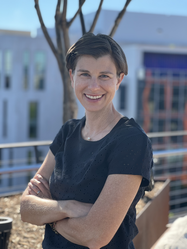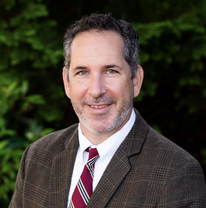|
It’s impossible to overstate Corinne Dedini’s impact at One Schoolhouse. Corinne’s intellect and integrity were essential to our adoption of personalized learning, our professional development programming, and our equity and inclusion work. Next month, she’ll leave the full-time staff at One Schoolhouse to become the Yosemite Region Director at NatureBridge, overseeing outdoor experiential education for thousands of learners. We’re delighted that Corinne will continue to consult for our academic program, and create professional learning experiences and resources for the Association for Academic Leaders. Read Corinne’s post about what teaching and gardening have in common–you’ll understand why she’s ready to get back into the great outdoors. If you’d like, take a moment to share a comment in appreciation of her work at One Schoolhouse in the comments below. From all of us, Corinne–thank you for your vision, dedication, and impact.
Which brings me to gardening. I grew up on a farm, and gardening remains my avocation. I learned how to be a good teacher by tending my plants, and to this day my most inspired education ideas come while digging in the dirt. Both practices come down to these simple truths:
The start you get impacts your entire trajectory: The research is resounding on the value of a strong start in academics - it’s why the board book industry exists! - but this extends to new endeavours across the learning arc. When students come into an online class, the onboarding activities they do are intentionally targeted towards teaching them how to manage themselves in a new learning space. Just as in my garden I cover seedlings so they don’t get burned by the spring sun or fall frost, in our classes we take care to ensure that each student gets the support they need to adjust to online learning. Every student (and every plant) depends on a good start. Being known matters: One of the first week’s activities in our classes asks each student to meet individually with their teacher to discuss goals for the year and talk about the type of support they’ll need in their online class. Instead of the online course feeling sterile, this practice creates immediate connection between student and teacher. Knowing how to support each student empowers our teachers to be responsive and to personalize the course for their learners. For example, one student this year told her teacher that her goal was “to learn how to read how to do things because at [my school] my teachers spend a lot of time telling me how to do things.” Aware that college will likely be different, she wants to focus on this academic skill deficit. Her One Schoolhouse teacher was able to suggest a regular, standing meeting while she is developing this skill so that she can learn to identify what is confusing and ask for clarification. In my garden, different plants have different soil and water requirements. If I plant my blueberries (which need slightly acidic soil) next to my strawberries (which need more fertilizer and water), the blueberries won’t produce. Every student (and every plant) has different needs, and we need to take time to learn what those needs are so we can respond appropriately. A healthy environment is crucial for growth: Children can’t learn if they don’t feel safe, and cultivating a physically and emotionally healthy classroom is the job of every educator. Online, this means structure: structures that make learning pathways easy to access, routines and rubrics that make expectations clear, formative assessments that let teachers and students identify struggles, and opportunities to try new things safely. In my garden, this means investing heavily in healthy soil, managing pests naturally, and ensuring that each plant gets the right amount of water. Every student (and every plant) can only thrive when conditions are just right. Perfect doesn’t pay: High achieving students - and this applies to almost all One Schoolhouse students - strive for excellence. While we don’t want to undercut the teaching of grit or the encouragement of hard work, it is a slippery slope from persistence to perfection. Here at One Schoolhouse, we are implementing practices that help students make holistic academic choices, such as recognizing when to move on. For example, our late work policy helps students to stay on track, catch up quickly if they fall behind, and occasionally realize that it’s ok to let something go. The process of learning can be messy, but the outcome can still be successful. Like students’ learning trajectories, my garden doesn’t always look tidy but the plants grow deep roots and strong shoots, and I regularly let a vine crawl out of its bed or prune back a sick plant to give it a fresh start. And if you sat at my dinner dinner table, you’d never guess that all the delicious food comes from such a tangle of vines and bushes. No student or plant looks perfect, but perfect isn’t necessary for a satisfying harvest. It isn’t just about the harvest: We forget that this work is seasonal. The structure of school is predicated on the expectation of outcomes - transcripts, resumes, college acceptances - but as educators, we want to raise lifelong learners. That’s why One Schoolhouse teachers design courses backwards from competencies, which we define as aptitudes that capture what we value. We want students to engage with the world using the practices essential to the discipline they are studying, and we measure mastery by their ability to transfer these competencies beyond the course. In my garden, what I do after the harvest - composting, mulching, pruning - is the most important factor in the longevity of my farm. Every teacher (and every gardener) should always be designing for the next season. So while you’re out picking pumpkins or planting fall lettuce this month, think about your students. Are they off to a good start? Have you taken time to have a one-on-one conversation with each student? Is there safe space for each student to grow? It isn’t too late to cultivate the soil for a fruitful year!
18 Comments
The second question stems from my belief that schools are meant to serve both an individual and social good. Thus, well-resourced schools have an even greater obligation to serve its students and the broader community. In short, private schools must also serve a public purpose.
I believe all well-resourced private schools must find ways to answer them with a “yes” if they truly wish to justify their existence and the privilege that having attended can confer upon students. However, the reality is that, although we might not want to admit it, it can be hard for many, if not most of our schools to truly answer these questions in the affirmative. Many private schools offer an almost identical curriculum to what you would find in public schools from World History and Biology in 9th grade through to AP courses in 12th grade. A few years back, a parent pointed out to me, with grave concern, that her daughter’s transcript looked identical to a friend’s daughter’s who went to a public school. In fact, most of the courses did have the exact same titles. “How does this differentiate my daughter?” the woman asked. Now I know the transcript – a list of course titles – is not, by any stretch, a reflection of what we provide students and the value we believe to be inherent in that, but at the same time, shouldn’t our program be different? That is what can distinguish us, that is part of what will make us worth our price tag. We know that solving the world’s complex problems requires an interdisciplinary approach. We know that experiential education leads to learning that is more lasting. And we have the freedom to quickly make the changes to put more progressive programs in place. Our value lies in our freedom to take institutional action. Nevertheless, we get bogged down in red tape of our own creation and make 7 year strategic plans that are primarily operational and financial and don’t address teaching and learning. We shy away from the real hard work that it takes to lead and carry out change, and so we stay the same, the same as we always were, and not that different from the many other schools whose price tags are far lower than ours. With regard to my second question about serving a social good, our schools have long paid lip service to this, encouraging their graduates during convocation and commencement speeches to go out and do good. Some of us have even gone so far as to require community service. But very few have been so bold as to change the organization of their curricula in ways that intentionally focus it on preparing students to address the many problems that currently plague our world. To truly serve a public purpose, independent schools must directly engage their students in thinking about pressing problems from an interdisciplinary perspective. For example, climate change should not be relegated to one unit of an environmental science class. Climate change — the science of it, the politics of it, the economics of it — must be the central focus of multiple required classes. The same can be said about problems of inequality, misinformation, political polarization, and tensions in international relations. Siloed academic departments need to become a thing of the past. Courses and distribution requirements need to be focused around the pressing problems of our time. To one day solve these problems students today need to develop creativity and ingenuity, they need to learn how to lead and how to collaborate. These skills also need to be at the heart of our curriculum. Yes, accurate knowledge matters (perhaps more than ever in our age of so easily shared misinformation), but skill-building needs to be at the center. We can help students to develop the skills they will need to solve the world’s problems, but we also need to give them the motivation. How many of our schools require courses in religion, civics, and moral philosophy? We need these courses not to indoctrinate students into thinking a certain way, but to make sure they are exposed to the range of ideas about what it means to live a meaningful life, to behave ethically, and to contribute to the common good. I know it won’t be easy, but surely, requiring such courses might help shift our schools from places where students go for self-advancement, concerned only with gaining an elite college admissions and a high paying job, to places where students leave with a deep understanding of their obligations to others. Our curriculum must aim students towards service beyond the self. Those two questions will likely remain on my white board for some time, but I am optimistic that the answer to both questions can eventually be yes. The first step toward making that a reality is openly acknowledging the importance of the questions and the work that needs to be done to get to yes! |
Don't miss our weekly blog posts by joining our newsletter mailing list below:AuthorsBrad Rathgeber (he/him/his) Archives
July 2024
Categories |



 RSS Feed
RSS Feed